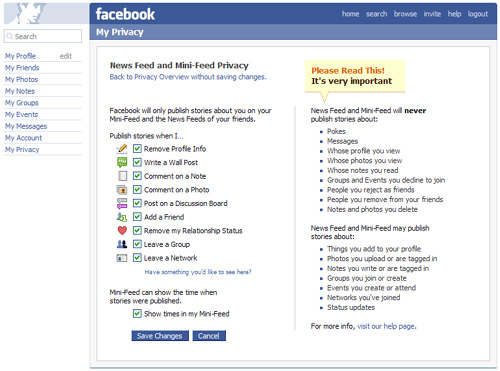Earlier in the week I reported on the extensive changes to Facebook which had a huge proportion of people – in numbers heading towards a million – up in arms.
Well, it seems the continued outrage (even after Mark Zuckerberg tried to explain) and growing online media coverage forced the creators of the social networking service to re-think their ways. And, in my opinion, they did exactly what they should have done in the first place: given the user control. So far as I can tell today, it ought to keep everyone happy.
Many proponents of the changes attacked the rioting users for demanding too much control from a 'service', whilst the latter group of people expected full control of their personal information by default. I'd say this possibly points to the way in which the general web population is becoming increasingly familiar with "contribution sites": websites which are built fundamentally around the concept of user contribution.
Easy compromise finally implemented
Either way, the correct steps seem to have finally been taken. As explained on a very prominent blog post (which actually sits atop each user's Facebook homepage for the time being), the Facebook team has made available to users complete control over which bits of information from their profile are included in their friends' Feed summaries.
When we launched News Feed and Mini-Feed we were trying to provide you with a stream of information about your social world. Instead, we did a bad job of explaining what the new features were and an even worse job of giving you control of them.
We made the site so that all of our members are a part of smaller networks like schools, companies or regions, so you can only see the profiles of people who are in your networks and your friends. We did this to make sure you could share information with the people you care about. This is the same reason we have built extensive privacy settings — to give you even more control over who you share your information with.
Somehow we missed this point with Feed and we didn’t build in the proper privacy controls right away. This was a big mistake on our part, and I’m sorry for it. But apologizing isn’t enough. I wanted to make sure we did something about it, and quickly. So we have been coding nonstop for two days to get you better privacy controls. This new privacy page will allow you to choose which types of stories go into your Mini-Feed and your friends’ News Feeds, and it also lists the type of actions Facebook will never let any other person know about.
Those who were fed up of the constant whining from opponents of this week's service changes may be upset that the post admits "we really messed this one up" and terms the problems "errors", since a popular argument seemed to be that any such changes to a service is just part of life and should be accepted at Face value. The phrases used by Zuckerberg basically amount to admitting that Facebook is and should be run as a collaborative tool, rather than a top-down service.
However, I'm sure the 742,400 current members of the group "Students against Facebook News Feed (Official Petition to Facebook)" will be all but unanimously necking an extra alcoholic beverage this fine Friday evening in celebration.
Here's a screenshot of the new privacy page:

Although it's a happy day indeed for all those for whom this addresses serious reservations about ever using Facebook again (and let's face it, that's life-altering change for hundreds of thousands of people with nothing better to do, including myself), this week's arguments did raise some points worth bearing mention.
To start with, the issue of privacy, and perhaps more predominantly customer confidence in privacy, has again been highlighted as being underestimated by increasingly popular websites. Google keeps coming out with new, interesting ideas that are just waiting for someone to sue out of privacy concerns. Google tries to ignore them; will Facebook learn from them?
Although in this case we're glad that there was an easily-reachable middle ground that provided the 'neat' functionality that the creators were striving for but also addressed major confidence issues, perhaps this will only be the first example in a long line of cases where the question of 'service or collaboration tool' splits the Internet community right down the middle.